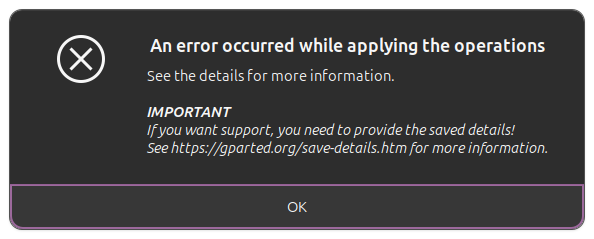I had a hard-disk with me. It is not usable because I did something wrong.
What i have done up until now:
- I tried to verify it’s existence using gparted. It showed unallocated storage.
- I tried to make a partition on the storage, it asked to create a partition table first.
- I created a gpt type partition table from the list.
- The partition table was created. Now I again tried to create a new partition. I selected ext4 (default), but during the process I encountered this:
These are the contents of the .htm file.
GParted 1.5.0
configuration --enable-libparted-dmraid --enable-online-resize
libparted 3.6
========================================
Device: /dev/nvme0n1
Model: HFM512GDJTNG-8310A
Serial:
Sector size: 512
Total sectors: 1000215216
Heads: 255
Sectors/track: 2
Cylinders: 1961206
Partition table: gpt
Partition Type Start End Flags Partition Name File System Label Mount Point
/dev/nvme0n1p1 Primary 2048 1050623 boot, esp fat32 /boot/efi
/dev/nvme0n1p5 Primary 1050624 1000214527 ext4 /, /var/snap/firefox/common/host-hunspell
========================================
Device: /dev/sda
Model: TOSHIBA External USB 3.0
Serial: 98B5T0BBT
Sector size: 512
Total sectors: 3907029164
Heads: 255
Sectors/track: 2
Cylinders: 7660841
Partition table: gpt
Partition Type Start End Flags Partition Name File System Label Mount Point
========================================
Create Primary Partition #1 (ext4, 1.82 TiB) on /dev/sda 00:02:45 ( ERROR )
create empty partition 00:00:13 ( SUCCESS )
path: /dev/sda1 (partition)
start: 2048
end: 3907028991
size: 3907026944 (1.82 TiB)
Set partition name to "partition1" on /dev/sda1 00:00:10 ( SUCCESS )
clear old file system signatures in /dev/sda1 00:00:01 ( SUCCESS )
write 512.00 KiB of zeros at byte offset 0 00:00:00 ( SUCCESS )
write 4.00 KiB of zeros at byte offset 67108864 00:00:00 ( SUCCESS )
write 4.00 KiB of zeros at byte offset 274877906944 00:00:00 ( SUCCESS )
write 512.00 B of zeros at byte offset 2000396214784 00:00:00 ( SUCCESS )
write 512.00 KiB of zeros at byte offset 2000397271040 00:00:00 ( SUCCESS )
flush operating system cache of /dev/sda 00:00:00 ( SUCCESS )
set partition type on /dev/sda1 00:00:00 ( SUCCESS )
new partition type: ext4
create new ext4 file system 00:02:21 ( ERROR )
mkfs.ext4 -F -O ^64bit -L 'T2' '/dev/sda1' 00:02:21 ( ERROR )
64-bit filesystem support is not enabled. The larger fields afforded by this feature enable full-strength checksumming. Pass -O 64bit to rectify.
Creating filesystem with 488378368 4k blocks and 122101760 inodes
Filesystem UUID: 5b6cea69-aa8b-454c-8759-a5d25891dbff
Superblock backups stored on blocks:
32768, 98304, 163840, 229376, 294912, 819200, 884736, 1605632, 2654208,
4096000, 7962624, 11239424, 20480000, 23887872, 71663616, 78675968,
102400000, 214990848
Allocating group tables: done
Writing inode tables: done
Creating journal (262144 blocks): done
Writing superblocks and filesystem accounting information: 0/14905
mke2fs 1.47.0 (5-Feb-2023)
mkfs.ext4: Input/output error while writing out and closing file system
